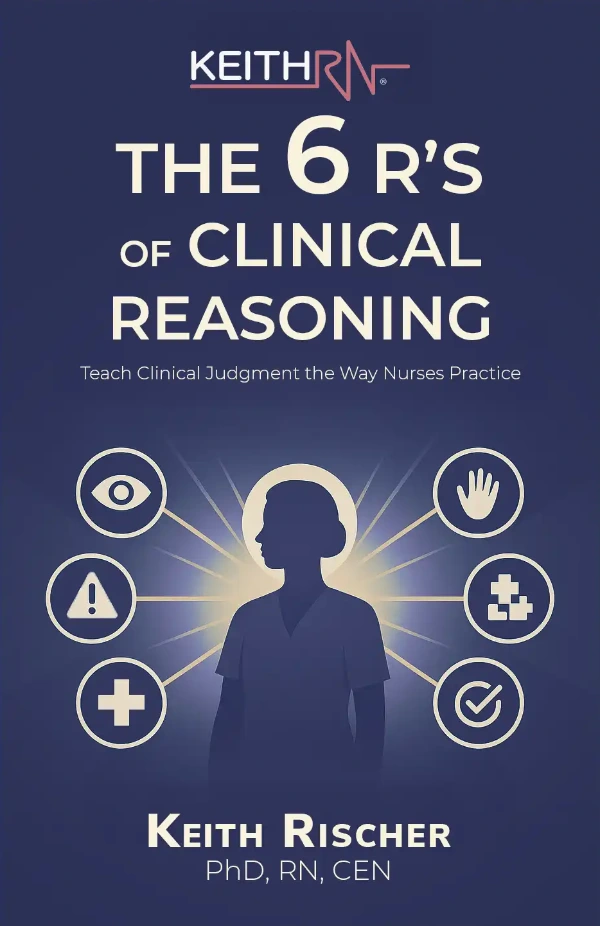
Though you do not possess the ability to read your student’s mind, you can use a simple strategy to know exactly what your students know and what they do not.
Ask the right questions.
In last weeks blog, What the Best Educators Do to Develop the Thinking of Students, I shared how asking questions is not only used by the most effective nurse educators but was also used extensively by Socrates and even Jesus.
Questions are one of the most effective ways to get inside the head of your students and assess how much they understand about critical concepts that directly relate to patient safety (see prior blog on Socratic questions for more on this topic).
Lessons from ICU
As a critical care nurse, understanding the mechanism of action of the most common medications is essential to develop the critical thinking and anticipation of expected physiologic effects and most common side effects.
When I was a new clinical adjunct and ICU nurse, I assumed that since students were currently in school, they would understand basic information about common medications including the mechanism of action.
I asked one advanced student to tell me about atenolol that she was going to pass that morning. She confidently responded that atenolol is a beta blocker and it was a safe dose to give, I innocently asked a simple question that I thought would be simple:
“What is a beta blocker blocking?”
She looked at me with a blank look and fear was clearly evident because she did not know the answer. I was confident that she knew the answer but I had to draw it out of her.
So I asked, “is this medication blocking sympathetic or parasympathetic nervous system stimulation?”
“Sympathetic”
I responded, “if it is blocking sympathetic stimulation, knowing how fight or flight will impact heart rate and blood pressure, how will this medication affect your patient if it blocking this effect?”
She confidently responded, “It will lower heart rate and blood pressure.”
By using additional questions of a lower level of difficulty (content), the correct answer was drawn out, and her confidence in her ability remained intact though it took additional time.
What…?
This exchange opened my eyes as an educator.
I never assumed since that just because a student can confidently state the PHARMACOLOGIC CLASS of any drug, that this equals knowledge and UNDERSTANDING of the mechanism of action.
What about you? As a clinical educator have you asked your students that following “what” questions to determine how much they really understand about pharmacology and physiology?
- WHAT is a beta blocker blocking?
- WHAT is a calcium channel blocker blocking?
- WHAT is an ACE inhibitor inhibiting?
This level of understanding is basic and must be expected even of fundamental students who just had A&P.
Emphasize Understanding NOT Parroting
Because once the student can communicate this level of understanding in their OWN WORDS, and not simply parrot what is written in the drug handbook, they will be able to readily identify the clinical RELATIONSHIP between the physiologic effect and the most common side effects and nursing assessments that are required by the nurse WITHOUT looking them up in the drug handbook!
For example, once the mechanism of a beta blocker is clearly understood, it becomes obvious that the assessments needed by the nurse in order to be safe to administer are BP and HR and that the most common side effects are low HR and hypotension!
Additional ‘What’ Questions
Since medication administration is an essential responsibility of the professional nurse, the following are a series I ask my students of the most common medications that must be deeply understood:
- WHAT is the pharmacologic class?
- WHAT is the mechanism of action (in your own words)?
- WHAT is the expected patient response based on the mechanism of action?
- WHAT assessments do you need to know before you administer and then follow up afterward
- WHY is your patient receiving? (not a ‘what’ but to deepen nurse thinking its all about the ‘whats’ and the ‘whys’!)
When a student can verbalize this series of ‘what’ questions, they have clearly communicated that they UNDERSTAND this essential content about medications and are safe to administer.
‘What’ If?
This series of questions guide students to identify the most likely/worst possible complication. This is the first step to prepare students to ‘rescue’ if there is a change in status.
In the clinical setting, faculty can use the most common complications to help develop this proactive nurse thinking skill. Expect students to not only identify the nursing assessments but also the interventions if any of these complications develop.
The following are examples of this line of questioning:
‘What if’ your patient…
- Develops chest pain?
- Develops a temp of 101?
- Drops BP to 90/50?
- Develops acute confusion on patient controlled analgesia?
- Develops rapid irregular heart rate of 140?
- Develops sudden onset of shortness of breath
‘What” and Priority Setting
Additional questions that students must be asked to break down the essence of clinical reasoning to practice also begin with ‘what’ and emphasize the importance of identifying correct priorities.
- What is the ONE THING you can do today to advance the plan of care.
- WHAT nursing priority captures the “essence” of your patient’s current status and will guide your plan of care?
- WHAT educational priorities have you identified and how will you address them?
In Closing
Let go of the tasks and medications that students pass each clinical day.
The most critical skill that needs to be developed in the clinical setting is the ability to think like a nurse by UNDERSTANDING and then applying knowledge to the practice setting.
By holding your students to a high bar of UNDERSTANDING key content, you may be remembered as difficult, but your students thank you after they graduate because you were the one who prepared them well for real-world clinical practice!
Comment Question:
What questions do you consistently utilize in the clinical setting to strengthen the thinking of your students?
Comment below and let the conversation begin!
Related Blogs
Keith Rischer – PhD, RN, CEN
As a nurse with over 35 years of experience who remained in practice as an educator, I’ve witnessed the gap between how nursing is taught and how it is practiced, and I decided to do something about it! Read more…
The Ultimate Solution to Develop Clinical Judgment Skills
KeithRN’s Think Like a Nurse Membership
Access exclusive active learning resources for faculty and students, including KeithRN Case Studies, making it your go-to resource.




